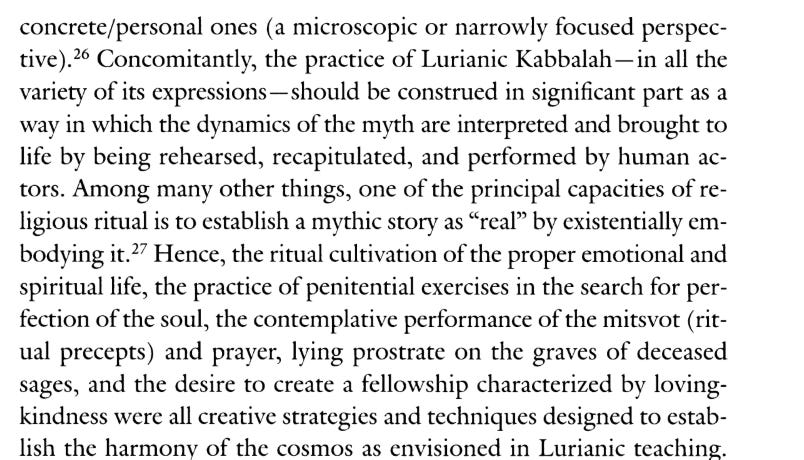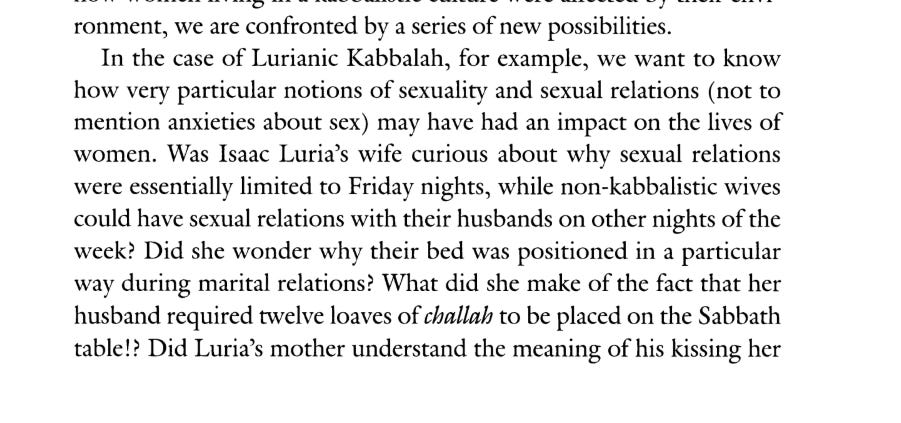Notes on Books I've Read: Physician of the Soul, Healer of the Cosmos, by Lawrence Fine
In which I go through passages I flagged in this book about Lurianic Kabbalah
I liked this book, even though I wanted it to be easier to understand, but that may just be the fault of Lurianic Kabbalah rather than of Lawrence Fine. He does a good job of painting the picture of the context and personalities of the people involved even if I still am kind of confused about the actual doctrines of Lurianic Kabbalah, which may require more than a book I read on a shabbos afternoon.
Also interesting is that Fine sees Luria as a doctor of sorts who provides personalized mystical prescriptions to his followers, and that’s sort of the thesis of the book. And when I went to his academia dot edu page, I found some medical papers written by him. Seems like Fine is also a doctor? Can’t find any confirmation of this, but that seems important for evaluating his argument.
We dive in.
page 2
So one of the things that I was and am interested in learning more about is why Lurianic Kabbalah became as popular as it did when the bar for entry is so high, ie, its incredibly hard to understand and learn and read. What itch did it scratch for the many people who got into it in the early modern period? So one of the ways Luria may have entered the mainstream is through stories told about him, and that continue to get told about him. This may even be a precursor to a similar phenomenon that happens with the Baal Shem Tov, though its importance for the history of the Chasidic movement is more obvious given the centrality of the Tzaddik and stories. But stories provide a way for the populace to take part in mysticism, even its only from afar, and maybe that’s an underrated reason why Luria’s stuff catches on.
page 14
Important point being made here that Lurianic Kabbalah is not just a mythos, it is a set of practices that embodies and makes real a mythos. It’s not just about the way in which the world was created, but about the role your actions and performance of mitzvot and rituals takes part in that functioning. That seems very important for what follows in the book, describing the rituals of Lurianic Kabbalah, which were one of the main means this stuff “caught on”.
page 15
Seems like an important methodological point (and there were female mystics, R. Chaim Vital mentions a bunch of them).
Next paragraph is kind of cool, too.
The negative space created by the silence of women in the written sources is sometimes overwhelming, but its worth pointing out whenever you can.
page 23
This is just a crazy thing I didn’t know. The Ottoman Empire did not allow the printing press to print works in their own language, which means they put themselves behind all the benefits the printing press provided, which is nuts! But even more nuts is that Jews were allowed to print in Hebrew. Imagine being in a society where your community is the only one allowed to print books they can read! That’s insane!
Page 32, I skipped all the stuff about the Ari’s life, apparently
So there are documents from the Arizal’s business in the Cairo Geniza?? Cool!
Page 34
Something very Jewish about even the most profound mystic in the tradition being rooted enough in life on earth that he has to do business.
Keep reading with a 7-day free trial
Subscribe to Volozhin and Kropotkin: A Misfit Torah Newsletter to keep reading this post and get 7 days of free access to the full post archives.











